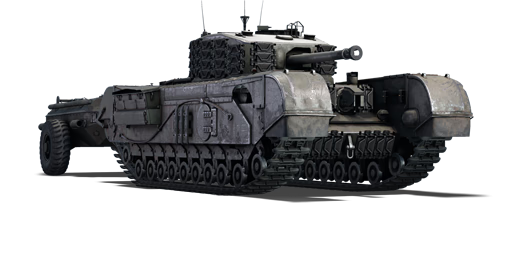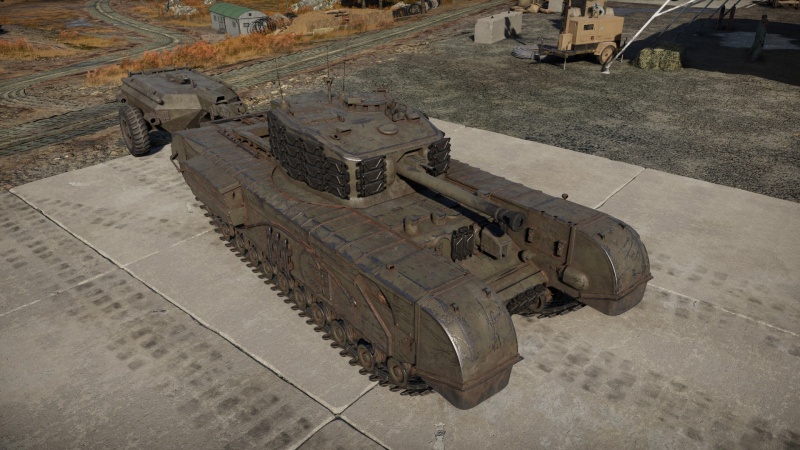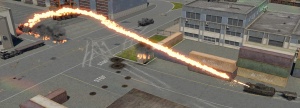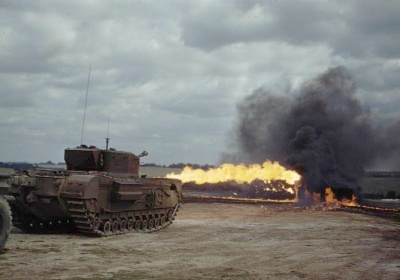Difference between revisions of "Churchill Crocodile"
m (→Pros and cons) (Tag: Visual edit) |
m (→Pros and cons) (Tag: Visual edit) |
(No difference)
| |
Latest revision as of 06:19, 18 April 2024
| This page is about the premium British heavy tank Churchill Crocodile. For other versions, see Churchill (Family). |
Contents
Description
The Tank, Infantry, Mk IV, Churchill VII (A22F) Crocodile is a premium gift rank III British heavy tank with a battle rating of 4.7 (AB/RB/SB). It was introduced in Update "Fire and Ice" as a reward for Battle Pass: Season IX, "Smell of Victory". The Churchill Crocodile differentiates itself from the Churchill VII with its flamethrower as an extremely effective secondary weapon against vehicles with exposed crew (SPAAs, tank destroyers, etc.).
General info
Survivability and armour
The Churchill Crocodile has the same armour layout as the Churchill VII, most enemy tanks will struggle to penetrate its excellent armour in a downtier. The armour can be further upgraded with additional tracks. Being angled and hull down significantly improves the survivability. The Crocodile is a good "shell magnet" for the team; attracting the main firepower from the enemy tanks while friendly tanks engage them, reducing the pressure on the friendly team significantly.
Armour type:
| Armour | Front (Slope angle) | Sides | Rear | Roof |
|---|---|---|---|---|
| Hull | 152 mm Front Plate 57.15 mm (66-67°) Front Glacis 139 mm (24°) Lower Glacis 95 mm Flamethrower Port |
95 mm | 50.8 mm (1°) Top 25.4 mm (64°) Bottom |
15.88-19.05 mm |
| Turret | 152 mm (20°) Turret Front 152 mm (26°) Gun Mantlet |
95.25 mm | 95.25 mm (1°) | 20 mm |
| Cupola | 152 mm | 152 mm | 152 mm | 20 mm |
Notes:
Mobility
The Churchill Crocodile retains the same slow mobility as the Churchill VII. It has a low top speed and difficulty to turn and climb slopes. It won't be the first to the frontline, but that means it will be ideal for a support role. The Crocodile is very difficult to manoeuvre in tight and narrow streets with its long hull and its towed trailer. With a terrible and slow reverse speed (-3 km/h), retreating is difficult and the vehicle is easily flanked by enemies close by.
| Game Mode | Max Speed (km/h) | Weight (tons) | Engine power (horsepower) | Power-to-weight ratio (hp/ton) | |||
|---|---|---|---|---|---|---|---|
| Forward | Reverse | Stock | Upgraded | Stock | Upgraded | ||
| Arcade | 22 | 3 | 45.2 | _,___ | 668 | __.__ | 14.78 |
| Realistic | 21 | 3 | _,___ | 350 | __.__ | 7.74 | |
Modifications and economy
Armaments
Main armament
The 75mm OQF Mk. V is an underwhelming gun for its BR. Its best shell can only go through 103 mm of armour. In an uptier, your gun will barely damage enemy vehicles. The most you can do is disable external components like barrels and tracks. The gun depression of -10 degrees allows for easier fighting in mountainous terrain. The gun sight has excellent zoom, making mid-range engagements easier.
| 75 mm OQF Mk.V | Turret rotation speed (°/s) | Reloading rate (seconds) | |||||||||||
|---|---|---|---|---|---|---|---|---|---|---|---|---|---|
| Mode | Capacity | Vertical | Horizontal | Stabilizer | Stock | Upgraded | Full | Expert | Aced | Stock | Full | Expert | Aced |
| Arcade | 84 | -12°/+20° | ±180° | N/A | 19.42 | 26.88 | 32.64 | 36.10 | 38.40 | 6.50 | 5.75 | 5.30 | 5.00 |
| Realistic | 14.28 | 16.80 | 20.40 | 22.56 | 24.00 | ||||||||
Ammunition
| Penetration statistics | |||||||
|---|---|---|---|---|---|---|---|
| Ammunition | Type of warhead |
Penetration @ 0° Angle of Attack (mm) | |||||
| 10 m | 100 m | 500 m | 1,000 m | 1,500 m | 2,000 m | ||
| M72 shot | AP | 91 | 88 | 78 | 67 | 57 | 49 |
| M61 shot | APCBC | 103 | 100 | 89 | 77 | 66 | 57 |
| M48 shell | HE | 10 | 10 | 10 | 10 | 10 | 10 |
| Shell details | ||||||||||||
|---|---|---|---|---|---|---|---|---|---|---|---|---|
| Ammunition | Type of warhead |
Velocity (m/s) |
Projectile mass (kg) |
Fuse delay (m) |
Fuse sensitivity (mm) |
Explosive mass (TNT equivalent) (g) |
Ricochet | |||||
| 0% | 50% | 100% | ||||||||||
| M72 shot | AP | 619 | 6.3 | - | - | - | 47° | 60° | 65° | |||
| M61 shot | APCBC | 618 | 6.53 | - | - | - | 48° | 63° | 71° | |||
| M48 shell | HE | 463 | 6.3 | 0 | 0.1 | 666 | 79° | 80° | 81° | |||
| Smoke shell characteristics | ||||||
|---|---|---|---|---|---|---|
| Ammunition | Velocity (m/s) |
Projectile mass (kg) |
Screen radius (m) |
Screen deploy time (s) |
Screen hold time (s) |
Explosive mass (TNT equivalent) (g) |
| M89 | 259 | 3 | 13 | 5 | 20 | 50 |
Ammo racks
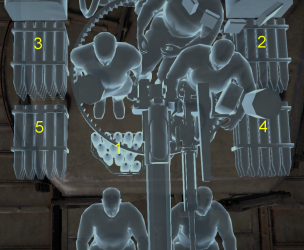
| Full ammo |
1st rack empty |
2nd rack empty |
3rd rack empty |
4th rack empty |
5th rack empty |
Visual discrepancy |
|---|---|---|---|---|---|---|
| 84 | 71 (+13) | 51 (+33) | 31 (+53) | 16 (+68) | 1 (+83) | No |
Notes:
- Racks disappear after you've fired all shells in the rack.
- Pack 16 (+68) shells to keep most of the hull empty.
Machine guns
As the flamethrower is unable to penetrate fully armoured vehicles, it is ineffective damage-wise against most tanks that a player will encounter. Due to the weight of fuel, flamethrowers can only hit targets at relatively short ranges.
However, this weapon is particularly useful for eliminating exposed crew members in open-topped vehicles and SPAA. For example, if a Churchill Crocodile shot flames at a Pz.IV H, it would take no damage. A Sd.Kfz. 6/2, however, would be burnt down within a few seconds.
This weapon is located in the bow gun position, replacing the machine gun mounted in the regular Churchill VII. As such, it has a very limited traverse and is dependent on the hull position for horizontal targeting. Vertical guidance is quite good, which can allow it to reach targets at short ranges outside of point-blank. Unfortunately, the slow speed of the Crocodile can make it difficult to get within range, so players will need to use the vertical limit to lob shots onto the enemy.
In attacking enemies that are fully armoured, a Churchill Crocodile can use its flamethrower to temporarily blind or distract the enemy. Fully armoured vehicles can be shot with flames to blind and confuse them which can allow the Crocodile to shoot back or reposition itself. Fire can serve as a deterrent to vehicles with exposed crew from getting too close, something that can be problematic for a Churchill tank.
Since this weapon is very unique, enemies will know a Churchill Crocodile is around when the flamethrower is used. When it is not in use, the fuel trailer is a major indicator of the vehicle. Flamethrower fuel tanks are susceptible to being shot. If this fuel tank is destroyed, it will explode. The tank crew will be unharmed, but the weapon system will be rendered unusable.
The use of the flamethrower is highly situational: most of the time, it will not damage enemy tanks that are adequately protected. Furthermore, the flamethrower's range is limited, and aiming it requires aiming the gun upwards, which can interfere with firing from the main gun.
| Flamethrower | ||||
|---|---|---|---|---|
| Mount | Capacity (Belt) | Fire rate | Vertical | Horizontal |
| Hull | 800 (800) | 1,200 | -5°/+30° | ±15° |
| 7.92 mm BESA | ||||
|---|---|---|---|---|
| Mount | Capacity (Belt) | Fire rate | Vertical | Horizontal |
| Coaxial | 9,450 (225) | 600 | N/A | N/A |
Usage in battles
The Churchill Crocodile is not too different from the Churchill VII, being a modified version with a flamethrower weapon in the bow gunner position.
The flamethrower is useful against open-topped vehicles, but otherwise the Churchill Crocodile's offensive capabilities remain the same as the Churchill VII with the 75 mm gun. Due to the 75 mm's low penetration and situational use of the flamethrower, it is recommended to work and rely on teammates to help destroy the enemy.
Thanks to its thick armour, the Churchill Crocodile can hold a strategic position, like a choke point or a capture zone. The tank's slow top speed, combined with its relatively poor main armament, makes it very situational most of the time. It will struggle to get into any strategic spots during matches, and extra care must be taken to avoid enemies camping around the maps at the start of a match.
Pros and cons
Pros:
- Access to a flamethrower, effective against open-topped vehicles
- Same tough armour of the Churchill VII
Cons:
- Flamethrower fuel is vulnerable to being shot
- Inadequate 75 mm gun, same as the one on the Churchill VII
- Slow reverse speed
- Very slow top speed
- The use of the flamethrower is situational as most tanks at this BR are fully enclosed
- Vulnerable to shots through the top front of the turret
- Worse overall mobility than Churchill VII due to the towed trailer
- Backing up is a problem in CQB as the trailer glitches if done incorrectly and will cause the entire tank to spin, slowly revealing the weak side armor.
History
With the First World War bringing about the development of the tank and the flamethrower, different nations would devise ways to combine the two into a single weapon system during the interwar period. A mobile armoured flamethrower would allow the short-ranged weapon system to get close to the enemy with minimal risk from small-arms fire.
In Britain, efforts by the Petroleum Warfare Department (PWD), Associated Equipment Company (AEC), and Ministry of Supply (MoS) would lead to the development of a flamethrower tank based on the Churchill infantry tank family.
This would be completed in the form of an fuel trailer towed behind the Churchill with lines connecting to a flame projector mounted in place of the bow machine gun. The trailer was lightly armoured and could resist light small-arms fire. If the trailer was destroyed or ran out of fuel, the crew could jettison it safely from the inside of the tank.
Churchill Crocodiles began service in the European Theatre in 1944 as part of specialized support units. The flamethrowers served as a potent psychological weapon as well, with many German troops choosing to surrender instead of being burned to death. They were deemed effective, despite their short range.
Crocodiles would go on to serve in the Korean War alongside other Churchill tanks until they were withdrawn from service in 1951.
Media
- Skins
- Videos
See also
Links to the articles on the War Thunder Wiki that you think will be useful for the reader, for example:
- reference to the series of the vehicles;
- links to approximate analogues of other nations and research trees.
External links
| Britain heavy tanks | |
|---|---|
| Matilda | Matilda III · Matilda Hedgehog |
| Churchill | Churchill I · Churchill III · Churchill VII · Churchill Crocodile · Churchill NA75 · Black Prince |
| Post-war | Caernarvon · Conqueror |
| Other | Independent · Excelsior · TOG II |
| Britain premium ground vehicles | |
|---|---|
| Light tanks | A13 Mk I (3rd R.T.R.) · A13 Mk II 1939 · AEC Mk II · Crusader "The Saint" · Rooikat 105 |
| Medium tanks | A.C.I · Grant I · Cromwell V (RP-3) · Sherman IC "Trzyniec" · A.C.IV · Comet I "Iron Duke IV" |
| Centurion Mk.2 · ▄Strv 81 (RB 52) · Centurion Mk.5 AVRE · Centurion Mk.5/1 · ▄Sho't Kal Dalet · Centurion Action X | |
| Vijayanta · Khalid · Challenger DS · Challenger 2 OES | |
| Heavy tanks | Independent · Matilda Hedgehog · Excelsior · TOG II · Churchill Crocodile · Black Prince |
| Tank destroyers | Alecto I · Achilles (65 Rg.) · QF 3.7 Ram |


